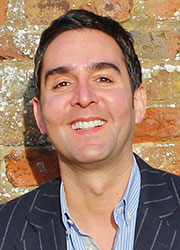 Mr Miguel Toribio-Mateas
Mr Miguel Toribio-Mateas
A Nutrition Health Professional & Nutrition Science Researcher / Lecturer with a specialism in Anti-Ageing, Functional & Regenerative Medicine & an evidence-informed Functional Medicine approach, combined with a background in Research technology, supporting medical, academic & scientific research communities worldwide. Director and Chair of Council of BANT
2014 Lecture: Nutrigenetics/Nutrigenomics: The Cornerstone of Personalised Anti-Ageing Nutritional Therapy
In the post-genome era, with the prevalence of nutrient metabolism disorders continuing to increase, non patient-centric "one size fits all" nutrition models have little if any validity. Nutritional Therapy, known in the US as Functional Medicine, is based on a health model where phenotype assessment is used alongside functional testing (blood, urine, etc.) to inform clinical decisions and enhance practitioner-patient education as part of a personalised disease risk reduction programme. The influence of evolution on individual gene response to specific food groups such as carbohydrates and fats (via PPAGy and APOE/APOA genes, respectively), as well as to other environmental factors such as physical activity (via FTO genes) influence the emergent phenotype, which results from the analysis of complex interactions between multiple genes, both epistatic and epigenetic, and environment. If a patient's case were to be compared with a puzzle where each piece poses a question, functional tests would provide answers to the "how / how much" and "when" questions by providing snapshots of the patient's biochemical individuality. However, only genetic data can answer why certain metabolic processes continue to pose a problem in certain clinical cases, leading to physical states typical of accelerated ageing, such as chronic low grade inflammation, high levels of oxidative stress or deranged methylation. By identifying genetic variants whose ultimate expression can be nutritionally modulated, the NT practitioner can recommend the use, reduction or exclusion of specific nutrition and other epigenetic factors such as physical exercise to impact on the regulation of genes, ultimately modulating their function to benefit the individual's overall health status. Consequently, Nutrigenetics provides at least one of the missing pieces to completing the successful ageing puzzle.